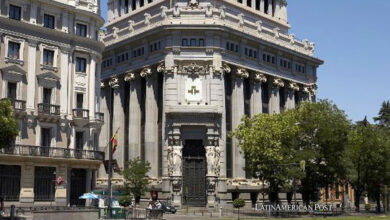Colombia: Natural resources are property of the State
According to the judicial entity, citizens can not prohibit or approve mining processes in their territory

According to El Espectador, nine popular consultations have been held in Colombia in order to know the decision of the people, in terms of mining extraction; and it was the same media that reported the response that predominated in these consultations: NO.
Leer en español: Colombia: Los recursos naturales son propiedad del Estado
However, after an appeal filed by the multinational Mansarovar Energy, according to El Tiempo, the Colombian Constitutional Court decided that "popular consultations can not prohibit extractive activities in the regions."
This decision is right in the argument that "you can not ignore the ownership of the subsoil and natural resources of all Colombians at the head of the State," said the Full Chamber of this Court.
Of course, the decision of the judicial entity was not well received among environmental defenders in the country, such as for example, the Green Alliance Party. The community of ecological ideology showed its discontent through a letter sent by its president, Jorge Ivan Ospina, on behalf of the entire party, reported El País de Cali.
"The Green Alliance Party expresses that popular consultations are a clear expression of participatory democracy, which can not be threatened by the economic interests of an energy mining locomotive that pretends to pass over citizens' decision-making on matters of transcendence. local, as it is the destination of the territory to the mining-energy industry ", wrote Ospina.
Also, the senator for the Democratic Pole, Jorge Robledo, through his Twitter account, labeled the decision of the Constitutional Court as a "blow to the defense of the environment in Colombia." Similarly, Robledo noted in his publication that this action is accompanied by the elimination of "the compensation of Cerromatoso in favor of injured communities (damage caused by extraction of Nickel) (…) and approve the Peñalosa plan in the Van der Hammen (urbanization project in a natural reserve) ".
Tres nuevos golpes a la defensa del ambiente en Colombia, incluidos dos de la @CConstitucional:
Eliminar la indemnización de Cerromatoso a favor de las comunidades lesionadas.
Golpear las consultas populares contra la mala minería.
Y aprobar el plan Peñalosa en la Van der Hammen— Jorge Robledo (@JERobledo) 12 de octubre de 2018
You may also be interested: Mexico: What is the Government doing in the face of floods in Sinaloa?
Another case: repression of social protest
However, this is not the first situation of this 2018, in which it has been observed how the Colombian authorities try to repress the samples of citizen participation in this country.
For example, Defense Minister Guillermo Botero explicitly showed his intentions to "organize" or "regulate" social protest in Colombia. These statements were also accompanied by those in which Botero claimed that "the protests were financed by armed organizations," as detailed by El Espectador.
For entities such as the Popular Research and Education Center (Cinep); or characters like the former presidential candidate, Gustavo Petro, the minister's words were an offense to democracy and the particular interests of the civilian population.
"With such reckless assertion (" the protests are financed by armed organizations "), you subtract the possibility that multiple and diverse social groups have a voice and visibility, deny the autonomy of groups, organizations and social movements to express disagreements, needs, proposals , occludes the possibility of social dialogue to which so many times the current president (Iván Duque) has referred, "wrote the researcher of the Cinep, Martha Cecilia García.
Las protestas son una forma de acción política no institucional que pone en evidencia precisamente las diferencias en el seno de la sociedad. #MinistroRespeteLaProtesta #Protesta
>>https://t.co/xbRUgAtWIo pic.twitter.com/OLs5xhh4yg— CINEP/PPP (@CINEP_PPP) 2 de octubre de 2018
For his part, Petro said that Guillermo Botero "(…) not only represents that concentration of wealth that is immersed in the commercial guild, but a retardant, anachronistic and backward mentality".
In addition, the current senator affirmed that Botero's possession as defense minister is the result of "the Colombian elite", the same "that has benefited precisely from the fact that society is so unequal"; and he assured that the Minister's words respond to "the Government fears that the citizens will express themselves freely".
LatinAmerican Post | Christopher Ramírez Hernández
Translated from: 'Colombia: Los recursos naturales son propiedad del Estado'
Listen this article





